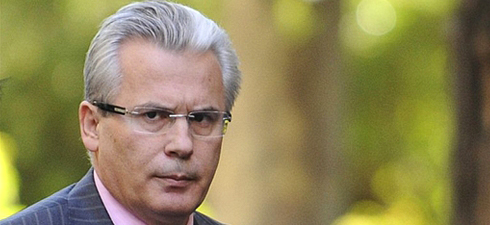A hero above reproach for some but a politicised megalomaniac for others, Baltasar Garzón, the investigating magistrate who "brought down" Augusto Pinochet, the Argentine dictators and many others, was charged on April 7 by Spain's Supreme Court of having overstepped his authority. Spain's most famous judge—arguably one of the most famous in the world—now stands accused of abuses of power while investigating the dictatorship of Francisco Franco, a subject that is still taboo in Spain and one considered by the country's right wing to be an unforgivable offence. Garzón now risks losing his job.
Over his 22-year judicial career, Baltasar Garzón has ruffled many a feather. Among his numerous enemies are of course politicians from both main political parties, who sing his praises one day only to find themselves under his investigative glare the next. The fallout from these rapid bouts of running hot and cold — and vice versa — has often been negative.
Never brought down a captain of big business
Garzón has never been low key. He has never shied away from challenges and has somehow always managed to end up with the most compelling cases of the day. Rare is the hot-button investigation that has slipped through his hands. He was one of the first judges to fight against narcotics trafficking, which at the time was transforming some Spanish regions into little Sicilies. He pursued pure and simple terrorism cases as well as acts of state terrorism and derivative forms like covert funding. He was unable to resist all manner of big city corruption cases. And, of course, Garzón successfully exported his prestige outside Spain by taking on high profile cases such as the investigation of Silvio Berlusconi (for alleged abuse at his Spanish subsidiary, Telecinco) and issuing arrest warrants for Chilean dictator Augusto Pinochet and terrorist Osama Bin Laden.
Despite being seen as a kind of global crime fighter, Garzón has been faulted by some for never having brought down a captain of big business. Although he did not handle the bankruptcy investigation of Banesto, the Spanish bank, some critics have accused him of treating with kid gloves other cases involving large Spanish banks like BBVA and Santander. Santander allegedly sponsored conferences he gave in the United States, an accusation the bank denies and a charge that could have cost Garzón his career.
Only case missing was that of historic figure
Tireless, Garzón stayed the course and continued to pursue big cases, but he seemed destined to remain the famous magistrate for centuries to come. His attempts to advance to a higher post within the National Court of the Supreme Court and at the International Court of Justice in The Hague ended in failure. He never seemed to be able to garner enough support from colleagues. There was always something standing in his way. People on his right and his left ultimately formed a majority unable to support him.
To look at everything he has accomplished, the only thing missing from his CV is an historic figure, a major personality to complete his collection of trophies. Having sifted through democracy and its failings, Garzón turned to the past and dug up Franco. To be sure, Garzón had settled the accounts of many people but had never dared to venture onto the dictator's territory. In the name of Spain's historical memory law, its imperfections and the unanswered requests of families of the thousands of victims gunned down under Franco, Garzón sought to put Francoism on trial. With his insomnia and personality enabling him to accomplish a considerable amount of work, he set about that task while trying to pick a fight with the People's Party (PP) over the Gurtel case - involving allegations of corruption, fraud and money laundering at high levels within the PP.
Is Garzón's time up?
Garzón has always been hunted by allies of his investigative targets. He knows the tune well, and is ready to face the music, as he states in his book El mundo sin miedo, "A World Without Fear", (Plaza y Janés, 2005). He has always been able to extract himself from the worst situations with the adeptness of a tightrope walker. And the other party has always come to his rescue.
But that's not the impression recently given members in the very closed world of the magistrature. This time, they are too numerous to be convinced that the end is coming. Too many — particularly among politicians — now believe Garzón's time is up, that he is no longer necessary. All have been victims of his cruelty. His writings conjure up the image of a man convinced that he has been put in the world to play a role and to accept the sacrifice demanded by the mission. The question is whether he is ready to accept an outcome that wasn't a part of his plan.
Was this article useful? If so we are delighted!
It is freely available because we believe that the right to free and independent information is essential for democracy. But this right is not guaranteed forever, and independence comes at a cost. We need your support in order to continue publishing independent, multilingual news for all Europeans.
Discover our subscription offers and their exclusive benefits and become a member of our community now!












